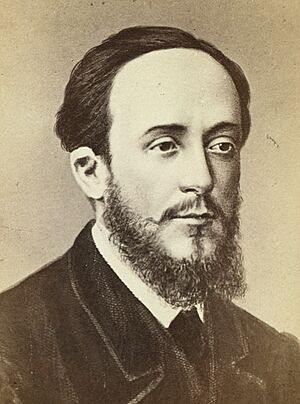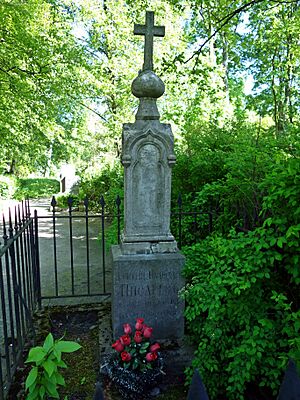Dmitry Pisarev facts for kids
Quick facts for kids
Dmitry Pisarev
|
|
|---|---|
| Дмитрий Писарев | |

Pisarev c. 1880–1886
|
|
| Born | October 14, 1840 Znamenskoye, Oryol Governorate, Russian Empire
|
| Died | July 16, 1868 (aged 27) Dubulti, Russian Empire
|
| Resting place | Literatorskie mostki, Volkovo Cemetery, Saint Petersburg |
| Nationality | Russian |
| Alma mater | Saint Petersburg Imperial University |
| Occupation | Literary critic, social critic, essayist, journalist |
| Years active | 1858–1868 |
| Known for | Promoting natural science, Bazarovism, proto-Nietzscheanism |
|
Philosophy career |
|
| Era | 19th-century philosophy |
| Region | Russian philosophy |
| School |
|
|
Notable ideas
|
|
|
Influences
|
|
|
Influenced
|
|
Dmitry Ivanovich Pisarev (October 14, 1840 – July 16, 1868) was an important Russian writer and thinker. He was a literary critic and philosopher. Pisarev was a key figure in a movement called Russian nihilism.
He is known for his ideas that influenced later thinkers like Friedrich Nietzsche. Pisarev also strongly supported liberation movements and natural science. His ideas had a big impact on Russian history.
One of his famous sayings was: "What can be smashed must be smashed." He believed that if something was strong, it would survive. If it broke easily, it was not useful. He wanted people to challenge old ways of thinking.
Pisarev wrote most of his works while he was in prison. He was arrested for writing against the government. He died at only 27 years old, just two years after being released. He also struggled with his mental health throughout his life. His writings influenced many people in Russia. This included revolutionaries like Vladimir Lenin and scientists like Ivan Pavlov, who won the Nobel prize.
Contents
Dmitry Pisarev's Early Life and Education
Dmitry Pisarev was born in Znamenskoye, a town in the western part of the Russian Empire. His family belonged to the landed aristocracy, meaning they owned a lot of land.
In 1856, he finished high school, called a gymnasium, in Saint Petersburg. That same year, he started studying history and philology (the study of language and literature) at Saint Petersburg Imperial University.
While still a student, he began writing for a women's liberal magazine called Rassavet in 1858. Between 1859 and 1860, he had a difficult time with his mental health. He received treatment for four months. After that, he went back to his studies and writing.
As a writer, he discovered the works of other radical thinkers. These included Nikolay Dobrolyubov and Nikolay Chernyshevsky. He loved these new ideas, saying they "forced me out of my confined cell into the fresh air."
He graduated in 1861. This was the same year that serfdom was abolished in Russia. Serfdom was a system where peasants were tied to the land and belonged to landowners. Also in 1861, the first big student protests happened in Saint Petersburg. By this time, Pisarev had fully adopted the nihilist way of thinking. He also stopped following his Orthodox Christian faith.
After graduating, he worked as an editor for different publications. In 1862, he was arrested for his writings against the government. He stayed in prison until 1866. After he was released, he continued his work as a writer.
In the summer of 1868, he died in a drowning accident. This happened at Dubulti, which is now in Latvia.
What Was Dmitry Pisarev's Legacy?
Pisarev was one of the writers who helped push for democratic changes in Russia in the 1860s. Many important Russians who came later, like those involved in the 1905 and 1917 revolutions, said Pisarev influenced them. For example, Nadezhda Krupskaya, who was Vladimir Lenin's wife, wrote that Lenin grew up influenced by Pisarev's ideas.
Pisarev also strongly supported natural science, especially biology. His writings greatly influenced the young Ivan Pavlov, who later became a famous scientist. Pisarev believed in positivism, which means focusing on facts and scientific observation. However, he also used imagination in his writing, which was a bit different from strict positivism.
He did not like romantic ideas. He felt they reminded him of the strict government he lived under. His main belief was a strong focus on science over art. He worked to show how literature and the world around us are connected.
Most of all, Pisarev wanted his readers to learn to think for themselves. He tried to achieve this through his philosophy, his literary reviews, and his analyses of society and families.
How Did Pisarev Influence Lenin?
Vladimir Lenin, a very important revolutionary leader, quoted Pisarev in his book What Is To Be Done?. Lenin used Pisarev's ideas about dreams and reality.
Pisarev wrote that some dreams might be far ahead of what's happening now. But if a person truly believes in their dream and works hard for it, it can be helpful. He said that such dreams can give people energy to work. If people couldn't dream of what they wanted to create, it would be hard to start big projects in art, science, or practical work.
Pisarev believed that if there is a connection between dreams and real life, then everything is good. Lenin used this idea to talk about the importance of having a clear vision for their political movement.
See also
 In Spanish: Dmitri Písarev para niños
In Spanish: Dmitri Písarev para niños
 | Emma Amos |
 | Edward Mitchell Bannister |
 | Larry D. Alexander |
 | Ernie Barnes |


